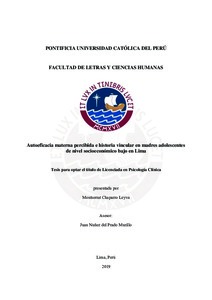Autoeficacia materna percibida e historia vincular en madres adolescentes de nivel socioeconómico bajo en Lima
Abstract
Diversos investigadores señalan que la maternidad en la adolescencia podría representar una
problemática con consecuencias negativas a distintos niveles, como en la calidad del cuidado
materno. Amplia literatura refiere que la autoeficacia materna y la historia de vínculo con los
cuidadores serían dos factores asociados a las problemáticas relacionadas a la maternidad
adolescente. Bibliografía teórica y empírica sugiere una posible relación entre las cualidades
del vínculo con las figuras cuidadoras y las creencias con respecto al desempeño materno.
Existen pocas investigaciones que estudien esta relación en Latinoamérica. Por ello, la presente
investigación tiene como objetivo principal evaluar y describir la posible relación entre la
autoeficacia materna y la historia vincular en un grupo de madres adolescentes de nivel
socioeconómico bajo de Lima. Asimismo, tiene como objetivos específicos identificar si
existen diferencias en el nivel de autoeficacia materna de acuerdo con las variables
sociodemográficas: percepción de apoyo de la pareja y grado de instrucción de las madres. Para
ello, se aplicó a 29 madres adolescentes entre 16 y 19 años (M = 17,52, DE = 1,326) la Escala
de Eficacia Parental - EEP (Farkas, 2008) y el Parental Bonding Instrument - PBI (Parker,
Tupling y Brown, 1979). No se encontraron correlaciones significativas entre los puntajes del
EEP y las escalas del PBI. En cuanto a los objetivos específicos, no se encontraron diferencias
significativas entre los puntajes del EEP de acuerdo con la variable percepción de apoyo del
padre y nivel educativo. Estos resultados constituyen un punto de partida para futuras
investigaciones. Several researchers point out that teenage motherhood could represent a problem with negative
consequences at different levels, such as the quality of maternal care. Extensive literature refers
that maternal self-efficacy and the history of bonding with caregivers would be two factors
associated with the problems related to adolescent maternity. There is theoretical and empirical
evidence that indicates a relationship between the qualities of the bond with caring figures and
beliefs regarding maternal performance. There is little research that studies this relationship in
Latin American. Therefore, this research aims to assess and describe the relationship between
maternal self-efficacy and Parental Bonding in a group of adolescent mothers of low
socioeconomic status in Lima. It also, has as specific objectives to identify whether there are
significant differences in the level of maternal self-efficacy according to the sociodemographic
variables: perception of partner’s support and level of education of the mothers. For this
purpose, Parental Efficacy Scale - EEP (Farkas, 2008) and the Parental Bonding Instrument –
PBI (Parker, Tupling y Brown, 1979) were applied to 29 teenage mothers between 16 and 19
years (M = 17,52, DE = 1,326). No significant correlations were found between the EEP scores
and the PBI scales. Regarding the specific objectives, no significant differences were found
between the EEP scores according to sociodemographic variables: perception of the partner’s
support and level of education of the mothers. These results are a starting point for future
research.
Temas
Autoeficacia
Maternidad
Madres adolescentes
Maternidad
Madres adolescentes
Para optar el título de
Licenciado en Psicología Clínica
Collections
The following license files are associated with this item:






